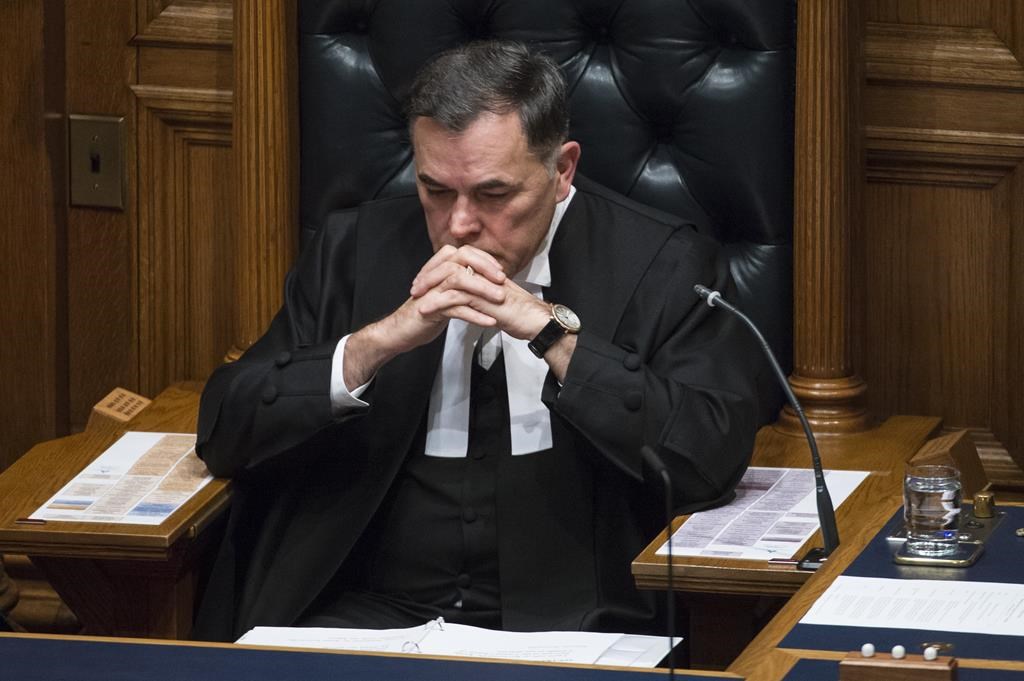Ban heckling in the B.C. legislature.

Establish a non-partisan “fact-checker” of statements made by MLAs in the Legislative Chamber.
Provide child care to enable participation in public consultation events.
Hold question period later in the day so it is less likely to be catered to the media.
These are just a handful of the more than 100 suggestions Speaker Darryl Plecas is putting forward in a report less than a week before he leaves the job. The suggestions stem from a series of roundtables Plecas has been hosting to improve the way the B.C. legislature operates.
Many of the suggestions are far outside the responsibilities of the Speaker and include guidance for elected officials, the public and the media.
“What I aim to leave through this report is a blueprint for real reforms that I see as being very implementable by the Legislative Assembly in the not-too-distant future,” Plecas writes.
“I also hope that the contents of this report will not only be insightful for the current Members of the Legislative Assembly, who largely have to be the drivers of change and reform, but to all British Columbians.”
Plecas has been a lightning rod for controversy during his time as Speaker.
As he leaves office there is still an ongoing police investigation into allegations brought forward by the Speaker about former clerk Craig James and former sergeant-at-arms Gary Lenz.

The accusations include inappropriate purchases including a wood splitter and trailer, as well as the disappearance of thousands of dollars of alcohol purchased by the Legislative Assembly.
Plecas’ latest report focuses more on the stated goal on strengthening “the ability of Members to fulfill their representative role” and to increase public accessibility, awareness, and understanding in relation to parliament.

Get breaking National news
The report recommends implementing term limits for MLAs. Currently, elected officials can serve their community for as long as they are elected.
The wide range of suggestions around elected officials also include offering training to MLAs on the power of both speech and listening, and offering MLAs regular professional development opportunities including training and education on topics including Indigenous history, anti-racism and work-life balance.
Recommendations also include encouraging MLAs, as a best practice, to respond to questions from the public in an individualized and timely manner.

The report also contains suggestions to provide an online mechanism for the public to submit questions for MLAs to bring forward to other members of the Legislative Assembly, and to institute an annual report card assessing MLA performance.
It is not the only recommendation based on establishing a report card.
Plecas is supporting a call for “an independent body” that would provide an “annual report card of the media’s coverage of the Legislative Assembly.”
On the media, the report also suggests working with the legislative press gallery to establish a fund to support access to the legislature for alternative media outlets, and encourage the legislative press gallery and other media to present news to the public “more like an accessible briefing note on relevance and less like a story about villains and heroes.”
- U.S. border crossings from Canada down 24 per cent as U.S. projected to lose billions
- Vancouver Island wood chip plant’s closure ‘a difficult moment,’ says CEO
- Man shot, killed in Burnaby had connection to B.C. gang conflict, investigators say
- Westham Island Bridge closed indefinitely as repairs more extensive, TransLink says
The report also suggests the Legislative Assembly move into the media realm itself, with the development of “regular themed podcasts with the Speaker, Cabinet Ministers and Opposition Critics to discuss topical issues and questions submitted by the public.”
But while the experts suggested a legislative podcast, they also suggested removing Hansard cameras from the chamber so legislators would not play to the cameras.
“The ideas generated were in some cases widely expressed across the various stakeholder groups, and in other cases, were raised in particular groups, often in relation to the expertise at the table,” the report reads.








Comments